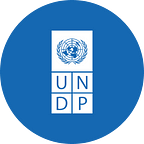Reframing the future of work in Ghana
Looking to the future & reckoning with our past
by UNDP Ghana Deep Demonstration team
Where it all began
In January 2020, prior to the first COVID-19 case in Ghana, UNDP in Ghana had sought views of a cross section of Ghanaians on what they thought was the greatest challenge that they needed to see resolved in this decade of action for the SDGs. Four in ten, that is 44.5% suggested this to be jobs (see Figure 1). What the results also showed is that 61.8% identified either the problem of jobs or skills. For Ghanaians, the pathway to steady and well-paying jobs is not straight forward though. While the national statistics show unemployment rate to be less than 10%, many Ghanaians consider the issue of jobs as one to address in this decade of SDG action. In addition, Government with its job’s agenda is remains committed to address this challenge.
The survey identified the top 3 solutions to ending the problem of jobs as creating more jobs, improving education, and strengthening governance (see Figure 2b). The other solutions included curbing corruption and improving infrastructure. These pre-determined solutions have been tried and tested with little success in Ghana. The consequence manifests in many ways, including disruptions, community cohesion that have national security implications. So what is actually going on here? How do we make sense of what is keeping Ghanaians from having more options for fulfilling opportunities to generate income and create value? How do we move beyond obvious solutions that do not seem to make the dial move?
The Deep Demonstration
On realization that despite the jobs remains a challenge despite multiple initiative, the UNDP Ghana Country Office sought to raise the level of ambition — one that could provide fresh and deeper perspectives on how to address the challenge on a bigger scale. In mid-2020, the Ghana Country office was privileged to be among the first cohort of Deep Demonstration initiative supported by UNDP’s Innovation Facility and generously funded by Danish Government. Deep Demonstrations are about using systems thinking to solve the biggest challenges of our times. It is also meant to identify a set of solutions and managing these solutions through a portfolio approach.
For over the 8 months, the Country Office went through an extensive process with our partner Chôra Foundation where we explored the issue of jobs. We soon discovered that in fact, in the Ghanaian, and indeed Africa tradition, the problem of lack of jobs was never a major concern. Going back into history, we came to appreciate that it was the manner in which work was defined and structured that allowed generations to live and work. Work was more than income, it was a means to the sense of belonging, self-worth, self-dignity, community cohesion and above all a way to secure generations after generations. And in order to build conditions for Ghanaians to pursue this, our work revealed the need to simultaneously work on establishing responsive public institutions, supporting effective citizen agency, and strengthening transformative business.
We can therefore not resolve the problem of jobs without going back to the past and using the present to define and transform the future of work. The future of work is much in the past — examining where things went wrong — as well as the future, embracing the changing global development landscape. That is how, what started as solving the problem of jobs become defining and structuring the future of work.
As a Country Office, we had to get things right from the start. We assembled a team across clusters — governance and peace, environment and climate, inclusive development, and accelerator lab. This choice has not only enabled us to tackle the future of work from multiple perspectives, but it has also helped break the “silo” ways of working. It also informed the diverse nature of the stakeholders with whom we consulted and the sensemaking for the entire country office. We continue to learn. The insights we are gaining regarding the future of work is that:
· It is about the value of work — We need to unlock new conversations that broaden the current value concepts to signal that work is beyond earnings, it is about human dignity, social cohesion and security. It is about integrating the African traditional perspectives that saw work as individual worth and dignity.
· It is about inclusive workspaces — We need to go to both the visible and invisible workspaces to unlock opportunities and dignify the jobs in those workspaces to create equal opportunity for all including for marginalized groups.
· It is about empowering local economies — we need to support mechanisms for local governments to explore, design and establish new local mandates and models with which to leverage local resources to create jobs.
· It is about transition out of informality for businesses– we need to enable and create new incentive structures to minimize trade-offs of formalizing businesses and create conditions for their own transformation.
What next
We are now at the stage where we are developing a portfolio of development options that can enable us to define, structure and support the delivery of the future of work. We will work through this process with our internal and external stakeholders to foster ownership and sustainability of the approach.
